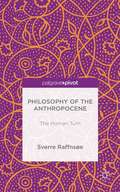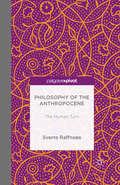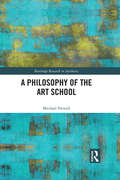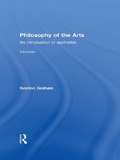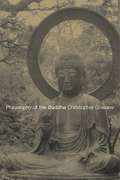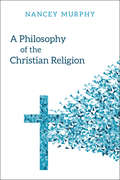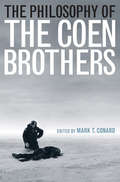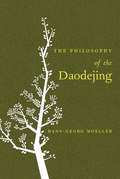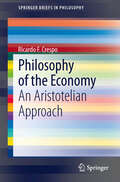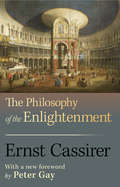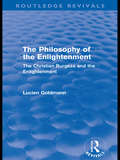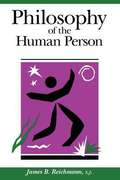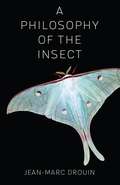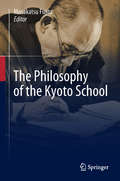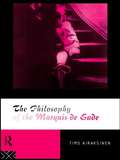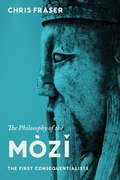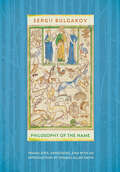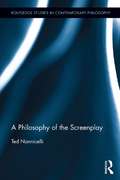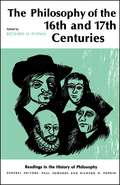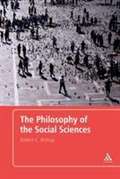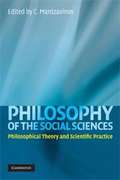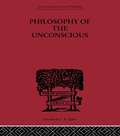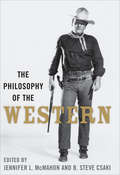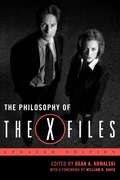- Table View
- List View
Philosophy of the Anthropocene: The Human Turn
by Sverre RaffnsøeThe Anthropocene is heralded as a new epoch distinguishing itself from all foregoing eons in the history of the Earth. It is characterized by the overarching importance of the human species in a number of respects, but also by the recognition of human dependence and precariousness. A critical human turn affecting the human condition is still in the process of arriving in the wake of an initial Copernican Revolution and Kant's ensuing second Copernican Counter-revolution.Within this landscape, issues concerning the human - its finitude, responsiveness, responsibility, maturity, auto-affection and relationship to itself - appear rephrased and re-accentuated as decisive probing questions. In this book Sverre Raffnsøe explores how the change has ramifications for the kinds of knowledge that can be acquired concerning human beings and for the human sciences as a study of human existential beings in the world.
A Philosophy of the Art School (Routledge Research in Aesthetics)
by Michael NewallUntil now, research on art schools has been largely occupied with the facts of particular schools and teachers. This book presents a philosophical account of the underlying practices and ideas that have come to shape contemporary art school teaching in the UK, US and Europe. It analyses two models that, hidden beneath the diversity of contemporary artist training, have come to dominate art schools. The first of these is essentially an old approach: a training guided by the artistic values of a single artist-teacher. The second dates from the 1960s, and is based around the group crit, in which diverse voices contribute to an artist’s development. Understanding the underlying principles and possibilities of these two models, which sit together in an uneasy tension, gives new insights into the character of contemporary art school teaching, demonstrating how art schools shape art and artists, how they can be a potent engine of creativity in contemporary culture and how they contribute to artistic research. A Philosophy of the Art School draws on first-hand accounts of art school teaching, and is deeply informed by disciplines ranging from art history and art theory, to the philosophy of art, education and creativity.
Philosophy of the Arts: An Introduction to Aesthetics
by Gordon GrahamPhilosophy of the Arts presents a comprehensive and accessible introduction to those coming to aesthetics and the philosophy of art for the first time. The third edition is greatly enhanced by new sections on art and beauty, modern art, Aristotle and katharsis, and Hegel. Each chapter has been thoroughly revised with fresh material and extended discussions. As with previous editions, the book: is jargon-free and will appeal to students of music, art history and literature as well as philosophy looks at a wide range of the arts from film, painting and architecture to fiction, music and poetry discusses a range of philosophical theories of thinkers such as Hume, Kant, Gaender, Collingwood, Derrida, Hegel and Croce contains regular summaries and suggestions for further reading.
Philosophy of the Buddha: An Introduction
by Christopher GowansPhilosophy of the Buddha is a philosophical introduction to the teaching of the Buddha. It carefully guides readers through the basic ideas and practices of the Buddha, including kamma (karma), rebirth, the not-self doctrine, the Four Noble Truths, the Eightfold Path, ethics, meditation, non-attachment, and Nibbâna (Nirvana).The book includes an account of the life of the Buddha as well as comparisons of his teaching with practical and theoretical aspects of some Western philosophical outlooks, both ancient and modern. Most distinctively, Philosophy of the Buddha explores how Buddhist enlightenment could enable us to overcome suffering in our lives and reach our full potential for compassion and tranquillity.This is one of the first books to introduce the philosophy of the Buddha to students of Western philosophy. Christopher W. Gowans' style is exceptionally clear and appropriate for anyone looking for a comprehensive introduction to this growing area of interest.
A Philosophy of the Christian Religion: An Introduction
by Nancey MurphyEach field of study comes with its own set of questions; each period of time refines and redirects those questions. The Christian religion as we find it in the twenty-first century presents a unique set of problems to be solved and questions to be answered. In this introduction to the philosophy of the Christian religion, eminent philosopher and theologian Nancey Murphy applies the tools of philosophical analysis to a set of core yet contemporary religious questions: what does our historical moment mean for the possibility of knowing God? Is faith still possible? Does God intervene in human history? Is there such a thing as universal knowledge of God? <P><P> Written with the needs of students encountering the philosophy of religion for the first time in mind, this book provides a comprehensive introduction to the fundamental questions inherent in Christian faith. Murphy also provides tools for how to answer those questions.
The Philosophy of the Coen Brothers (The Philosophy of Popular Culture #Ppcs)
by Mark T. ConardMany critics agree that Joel and Ethan Coen are one of the most visionary and idiosyncratic filmmaking teams of the last three decades. Combining thoughtful eccentricity, wry humor, irony, and often brutal violence, the Coen brothers have crafted a style of filmmaking that pays tribute to classic American movie genres yet maintains a distinctly postmodern feel. Since arriving on the film scene, the Coens have amassed an impressive body of work that has garnered them critical acclaim and a devoted cult following. From Raising Arizona and Fargo to O Brother, Where Art Thou? and No Country for Old Men, the Coens have left an unmistakable imprint on Hollywood. The Philosophy of the Coen Brothers investigates philosophical themes in the works of these master filmmakers and also uses their movies as vehicles to explore fundamental concepts of philosophy. The contributing authors discuss concepts such as justice, the problem of interpretation, existential role-playing, the philosophy of comedy, the uncertainty principle, and the coldness of modernity. The Philosophy of the Coen Brothers is not just for die-hard Lebowski Fest attendees, but for anyone who enjoys big ideas on the big screen.
The Philosophy of the Daodejing: The New, Highly Readable Translation Of The Life-changing Ancient Scripture Formerly Known As The Tao Te Ching (Philosophy)
by Hans-Georg MoellerFor centuries, the ancient Chinese philosophical text the Daodejing (Tao Te Ching) has fascinated and frustrated its readers. While it offers a wealth of rich philosophical insights concerning the cultivation of one's body and attaining one's proper place within nature and the cosmos, its teachings and structure can be enigmatic and obscure. Hans-Georg Moeller presents a clear and coherent description and analysis of this vaguely understood Chinese classic. He explores the recurring images and ideas that shape the work and offers a variety of useful approaches to understanding and appreciating this canonical text. Moeller expounds on the core philosophical issues addressed in the Daodejing, clarifying such crucial concepts as Yin and Yang and Dao and De. He explains its teachings on a variety of subjects, including sexuality, ethics, desire, cosmology, human nature, the emotions, time, death, and the death penalty. The Daodejing also offers a distinctive ideal of social order and political leadership and presents a philosophy of war and peace.An illuminating exploration, The Daodejing is an interesting foil to the philosophical outlook of Western humanism and contains surprising parallels between its teachings and nontraditional contemporary philosophies.
Philosophy of the Economy
by Ricardo F. CrespoThis book develops a philosophical analysis of economic reality and economic science from an Aristotelian point of view. It is the result of many years of thinking and philosophical study about these topics. It differs from other philosophy of economics books as it also deals with economic reality (not only the science) and approaches its subject from an Aristotelian perspective. It differs from other Aristotelian studies about economics as it covers the whole of philosophy of the economy. This book argues why Aristotle's thinking guarantees an appropriate interdisciplinary synthesis.
The Philosophy of the Enlightenment
by Ernst Cassirer Peter GayThe present book aims to be both more and less than a monograph on the philosophy of the Enlightenment. It is much less, for the primary task of such a monograph would be to offer the reader a wealth of detail and to trace the genesis and development of all the special problems of this philosophy.
The Philosophy of the Enlightenment: The Christian Burgess and the Enlightenment (Routledge Revivals)
by Lucien GoldmannIn this reissue, originally published in English in 1973, French philosopher Lucien Goldmann turns his attention to the Enlightenment of the eighteenth century, the great age of liberalism and individualism and analyses the ‘mental structures’ of the outlook of the philosophes, who showed that the ancien regime and the privileges of the Church were irrational anachronisms. In assessing the strengths and limitations of individualism, Goldmann considers the achievements and limitations of the Enlightenment. He discusses the views of Hegel and Marx and examines the relation between liberal scepticism and traditional Christianity to point the way to the possible reconciliation of the two seemingly incompatible ‘world visions’ of East and West today.
Philosophy of the Human Person
by James B. ReichmannThis book provides the student of philosophy with a comprehensive discussion of the human experience, with the single aim of uncovering the meaning of being human.
A Philosophy of the Insect
by Jean-Marc DrouinThe world of insects is at once beneath our feet and unfathomably alien. Small and innumerable, insects surround and disrupt us even as we scarcely pay them any mind. Insects confront us with the limits of what is imaginable, while at the same time being essential to the everyday functioning of all terrestrial ecosystems.In this book, the philosopher and historian of science Jean-Marc Drouin contends that insects pose a fundamental challenge to philosophy. Exploring the questions of what insects are and what scientific, aesthetic, ethical, and historical relationships they have with humanity, he argues that they force us to reconsider our ideas of the animal and the social. He traces the role that insects have played in language, mythology, literature, entomology, sociobiology, and taxonomy over the centuries. Drouin emphasizes the links between humanistic and scientific approaches—how we have projected human roles onto insects and seen ourselves in insect form. Caught between the animal and plant kingdoms, insects force us to confront and reevaluate our notions of gender, family, society, struggle, the division of labor, social organization, and individual and collective intelligence. A remarkably original and thought-provoking work, A Philosophy of the Insect is an important book for animal studies, environmental ethics, and the history and philosophy of science.
The Philosophy of the Kyoto School
by Masakatsu FujitaThe main purpose of this book is to offer to philosophers and students abroad who show a great interest in Japanese philosophy and the philosophy of the Kyoto school major texts of the leading philosophers. This interest has surely developed out of a desire to obtain from the thought of these philosophers, who stood within the interstice between East and West, a clue to reassessing the issues of philosophy from the ground up or to drawing new creative possibilities.The present condition seems to be, however, that the material made available to further realize this kind of intellectual dialogue is far too scarce. This book is intended to be of some help in this regard.The book presents selected texts of representative philosophers of the Kyoto school such as Nishida Kitaro, Tanabe Hajime, Miki Kiyoshi, Nishitani Keiji, and others who best illustrate the characteristics of this school, and works that together portray its image as a whole. Those who are interested in Japanese philosophy or specifically the philosophy of the Kyoto School can survey a comprehensive representation from this book.These texts are, of course, quite difficult and cannot be well understood without sufficient preliminary knowledge. Expository essays have therefore been included after each text to provide guidance. In each of these commentaries a scholar of our time with deep understanding of the philosopher in question has provided an account of his life, intellectual journey, and the significance of the text included here.From this book will emerge a new dialogue of ideas that in turn will engender new developments in philosophy, thereby further expanding the network of philosophical thought worldwide.
The Philosophy of the Marquis de Sade
by Timo AiraksinenThe Marquis de Sade is famous for his forbidden novels like Justine, Juliette, and the 120 Days of Sodom. Yet, despite Sade's immense influence on philosophy and literature, his work remains relatively unknown. His novels are too long, repetitive, and violent. At last in The Philosophy of the Marquis de Sade, a distinguished philosopher provides a theoretical reading of Sade. Airaksinen examines Sade's claim that in order to be happy and free we must do evil things. He discusses the motivations of the typical Sadean hero, who leads a life filled with perverted and extreme pleasures, such as stealing, murder, rape, and blasphemy. Secondary sources on Sade, such as Hobbes, Erasmusm, and Brillat-Savarin are analyzed, and modern studies are evaluated. The Philosophy of the Marquis de Sade greatly enhances our understanding of Sade and his philosophy of pain and perversion.
The Philosophy of the Mòzĭ: The First Consequentialists
by Chris FraserMohism was an ancient Chinese philosophical movement founded in the fifth century BCE by the charismatic artisan Mòzi, or "Master Mo." Its practitioners advanced a consequentialist ethics, along with fascinating political, logical, and epistemological theories, that set the terms of philosophical argumentation and reflection in China for generations to come. Mohism faded away in the imperial era, leaving the impression that it was not as vital as other Chinese philosophical traditions, yet a complete understanding of Confucianism or Daoism is impossible without appreciating the seminal contribution of Mohist thought. The Philosophy of the Mòzi is an extensive study of Mohism, situating the movement's rise and decline within Chinese history. The book also emphasizes Mohism's relevance to modern systems of thought. Mohism anticipated Western utilitarianism by more than two thousand years. Its political theory is the earliest to outline a just war doctrine and locate the origins of government in a state of nature. Its epistemology, logic, and psychology provide compelling alternatives to contemporary Western mentalism. More than a straightforward account of Mohist principles and practice, this volume immerses readers in the Mohist mindset and clarifies its underpinning of Chinese philosophical discourse.
The Philosophy of the Mòzi: The First Consequentialists
by Chris FraserMohism was an ancient Chinese philosophical movement founded in the fifth century BCE by the charismatic artisan Mòzi, or "Master Mo." Its practitioners advanced a consequentialist ethics, along with fascinating political, logical, and epistemological theories, that set the terms of philosophical argumentation and reflection in China for generations to come. Mohism faded away in the imperial era, leaving the impression that it was not as vital as other Chinese philosophical traditions, yet a complete understanding of Confucianism or Daoism is impossible without appreciating the seminal contribution of Mohist thought.The Philosophy of the Mòzi is an extensive study of Mohism, situating the movement's rise and decline within Chinese history. The book also emphasizes Mohism's relevance to modern systems of thought. Mohism anticipated Western utilitarianism by more than two thousand years. Its political theory is the earliest to outline a just war doctrine and locate the origins of government in a state of nature. Its epistemology, logic, and psychology provide compelling alternatives to contemporary Western mentalism. More than a straightforward account of Mohist principles and practice, this volume immerses readers in the Mohist mindset and clarifies its underpinning of Chinese philosophical discourse.
Philosophy of the Name (NIU Series in Orthodox Christian Studies)
by Sergii BulgakovThis is the first English translation, by Thomas Allan Smith, of Philosophy of the Name (Filosofiia imeni). Sergii Bulgakov (1871–1944) wrote the book in response to a theological controversy that erupted in Russia just before the outbreak of World War I. Bulgakov develops a philosophy of language that aims to justify the truthfulness of the statement "the Name of God is God himself," a claim provoking debate on the meaning of names, and the Name of God in particular. Philosophy of the Name investigates the nature of words and human language, considers grammar and parts of speech, and concludes with an exposition on the Name of God.Name-glorifying, a spiritual movement connected with the Orthodox practice of the Jesus Prayer, was initially censured by the Holy Synod of the Russian Orthodox Church, and the controversy raised profound questions that continue to vex ecclesiastical authorities and theologians today. The controversy exposed a vital question concerning the ability of human language to express experiences of the Divine truthfully and authentically. Bulgakov examines the idea that humans do not create words, rather, objects speak their word to human beings, and words are the incarnation of thought in a sonic body conveying meaning.Philosophy of the Name offers a philosophy of language for contemporary theologians of all confessions who wrestle with the issue of language and God. It is a persuasive apologia for the mysterious power of words and an appeal to make use of words responsibly not only when speaking about God but equally when communicating with others.
A Philosophy of the Screenplay (Routledge Studies in Contemporary Philosophy)
by Ted NannicelliRecently, scholars in a variety of disciplines—including philosophy, film and media studies, and literary studies—have become interested in the aesthetics, definition, and ontology of the screenplay. To this end, this volume addresses the fundamental philosophical questions about the nature of the screenplay: What is a screenplay? Is the screenplay art—more specifically, literature? What kind of a thing is a screenplay? Nannicelli argues that the screenplay is a kind of artefact; as such, its boundaries are determined collectively by screenwriters, and its ontological nature is determined collectively by both writers and readers of screenplays. Any plausible philosophical account of the screenplay must be strictly constrained by our collective creative and appreciative practices, and must recognize that those practices indicate that at least some screenplays are artworks.
Philosophy of the Sixteenth and Seventeenth Centuries
by Richard H. PopkinPhilosophers of the Sixteenth and Seventeenth Century
The Philosophy of the Social Sciences: An Introduction
by Robert BishopThe book not only offers lucid and incisive coverage of the philosophy of the social sciences, but also extends the major debates and considers the latest directions in this growing area of philosophical interest. Robert C. Bishop's cogent and rigorous analysis is supplemented by useful pedagogical features, including key examples from philosophical writing; summaries of core debates; sample questions and exercises; and guides for further reading.
Philosophy of the Social Sciences: Philosophical Theory and Scientific Practice
by C. MantzavinosThis volume is a unique contribution to the philosophy of the social sciences, presenting the results of cutting-edge philosophers' research alongside critical discussions by practicing social scientists. The book is motivated by the view that the philosophy of the social sciences cannot ignore the specific scientific practices according to which social scientific work is being conducted, and that it will be valuable only if it evolves in constant interaction with theoretical developments in the social sciences. With its unique format guaranteeing a genuine discussion between philosophers and social scientists, this thought-provoking volume extends the frontiers of the field. It will appeal to all scholars and students interested in the interplay between philosophy and the social sciences.
Philosophy of the Unconscious: Speculative Results According To The Inductive Method Of Physical Science (classic Reprint) (International Library of Philosophy #Vol. 4)
by Eduard Von HartmannThis is Volume VII of eight in a series on the Philosophy of Mind and Language. Originally published in 1931, this book presents Speculative Results according to the Inductive Method of Physical Science. Interest in Hartmann’s conception of the Unconscious until the beginning of the present century was primarily metaphysical; his treatise was merely the first, and most significant, of the thirty volumes which set forth his “system.”
The Philosophy of the Western (The Philosophy of Popular Culture #Ppcs)
by Jennifer L. McMahon B. Steve CsakiThe western is arguably the most iconic and influential genre in American cinema. The solitude of the lone rider, the loyalty of his horse, and the unspoken code of the West render the genre popular yet lead it to offer a view of America's history that is sometimes inaccurate. For many, the western embodies America and its values. In recent years, scholars had declared the western genre dead, but a steady resurgence of western themes in literature, film, and television has reestablished the genre as one of the most important.In The Philosophy of the Western, editors Jennifer L. McMahon and B. Steve Csaki examine philosophical themes in the western genre. Investigating subjects of nature, ethics, identity, gender, environmentalism, and animal rights, the essays draw from a wide range of westerns including the recent popular and critical successes Unforgiven (1992), All the Pretty Horses (2000), 3:10 to Yuma (2007), and No Country for Old Men (2007), as well as literature and television serials such as Deadwood. The Philosophy of the Western reveals the influence of the western on the American psyche, filling a void in the current scholarship of the genre.
The Philosophy of The X-Files: Updated Edition (The Philosophy of Popular Culture #Ppcs)
by Dean A. KowalskiIn The Philosophy of The X-Files, Dean A. Kowalski has gathered a remarkable cast of contributors to shed light on the philosophical mysteries of the television show The X-Files. With sections devoted to the show's credos, such as "The Truth Is Out There," individual characters, and specific episodes, The Philosophy of The X-Files illuminates the philosophical assumptions and presuppositions of the show as well as presents discussions through the show to help the reader better understand philosophy and philosophical inquiry.
